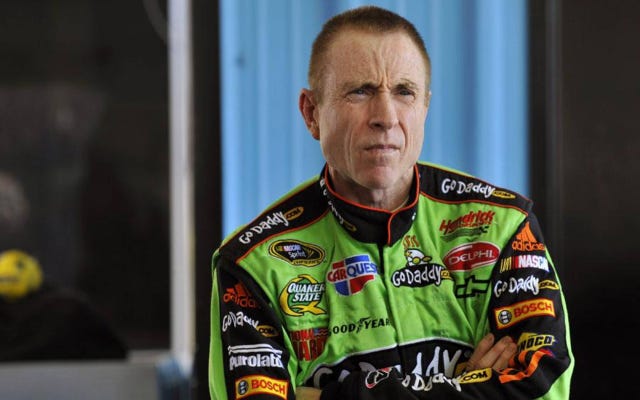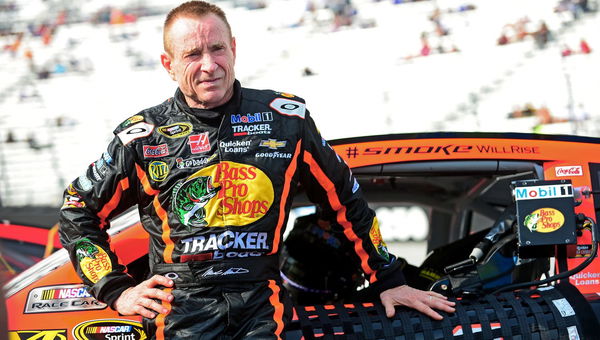
Imago
LAT PHOTOGRAPHIC

Imago
LAT PHOTOGRAPHIC
NASCAR history has a way of reminding fans that no two seasons are ever the same. In the old Winston Cup days, during the Latford points system, NASCAR was a season-long endurance test rather than a knockout drama. A standout example is the dramatic 1979 season, where Richard Petty battled veteran Darrell Waltrip right down to the final race at Ontario Motor Speedway. Petty erased a 229-point deficit entering the American 500 and then held on to edge Waltrip by just 11 points, the smallest margin in Cup history up to that time. That low-points cushion underlines the weight of every lap led, every bonus point for leading laps. And one such NASCAR legend, Mark Martin’s journey, mirrored that old-school ethos.
Watch What’s Trending Now!
From short-track zippers in Wisconsin to nearly 100 wins in NASCAR’s top divisions, Martin became legendary not just for victories, but for precision, fitness, and unwavering consistency. He famously finished runner-up in the championship standings four times in just a handful of years, often by margins of under 50 points, such as in 2002 when Tony Stewart clinched the title by just 38 points, while Martin finished fourth in the finale. His career reflected the old format’s essence: margin by margin, lap by lap, master the long haul. Now, in an era where NASCAR’s playoffs have transformed the way champions are crowned, Martin delivered a ‘Super Bowl’ verdict that challenged fans to rethink how they measure greatness.
Why Mark Martin wants fans to be patient with the new system
In a recent episode of the Door Bumper Clear podcast, along with Freddie Kraft, Tommy Baldwin, and Karsyn Elledge, Mark Martin opened the conversation with a reminder about racing’s old-school stakes. “Well, under the old systems, 1992, I mean, it came down to Alan Kulwicki leading one more lap,” said Martin. His reference harks back to a time when championships were decided purely by season-long accumulation of points, lap-by-lap, no resets, and no brackets. Despite some fan nostalgia, media criticism notes that most pre-2004 seasons were decided well before the finale, reducing late-season drama.
The 1991 Winston Cup, for instance, showcased pure points drama. Six drivers, including Alan Kulwicki, Bill Elliott, Davey Allison, Harry Grant, Kyle Petty, and Mark Martin, all entered the final race at Atlanta with a mathematical chance at the title. Kulwicki, running his underdog team, had built a points deficit earlier in the year but clawed back with a 278-point recovery in just 6 races, earning several second and fourth-place results in key events like Pocono and Phoenix. Then in the famed Hooters 500 finale, Bill Elliott won the race but Kulwicki led one more lap, 103 laps versus Elliott’s 102, securing the critical five-point ‘most laps’ bonus and clinching the championship by just 10 points. That setup laid the groundwork for why Martin’s views about consistency matter in the modern NASCAR era.
He shifted his attention to draw a sports parallel that revealed his broader worldview. “It’s just I don’t watch any other sports, none, except for the Super Bowl every year, I watch that,” Martin reflected. “And I thought this was a snoozer last year. But it’s not going to stop me from watching it next year because it might be incredible. And that’s how racing is.” Just as fans tune in annually hoping for a thriller, even after a dull game, Martin believes NASCAR deserved that same patience. His statement also mirrors his belief in playoff unpredictability; the elimination rounds may produce duds, but also shockers, especially with this year’s addition of the In-Season Challenge, ultimately won by Joe Gibbs’ grandson Ty Gibbs. But this variability also comes with the unpredictability of life off track.

USA Today via Reuters
Andrew Weber – USA Today Sports
“You’ll have a runaway, but if you lined them up tomorrow and ran the same race again, it could be a whole different game,” Martin continued. “So, people have to be patient. You can’t just say, ‘well, we had one runaway championship.'” The current playoff often rewards the luckiest or best Phoenix performer rather than the most consistent driver. The contrast to the old format, with 36 races and no reset, is clear. Just like Joey Logano clinched the 2024 NASCAR Cup Series Championship despite posting a season-worst average finish of 17.1. This was the lowest ever for a champion, overshadowing more consistent drivers like Kyle Larson, who missed the final four despite having six wins during the season.
“It’s just the same point being with Logano’s championship last year,” Martin echoed that sentiment. “Not every championship is going to go down the way it did last year. They’re all different, for sure.” In the end, Martin’s reflection isn’t just about defending one season’s outcome; it is about embracing NASCAR’s inherent unpredictability. The beauty of the sport lies in its ability to produce champions through countless different paths, each shaped by unique circumstances.
Brad Keselowski sets bold target for final playoff push.
As the playoff cutoff looms just five races away, Brad Keselowski is steering RFK Racing into its most critical stretch yet. With Chris Buescher’s #17 “in a really good position to point their way in” and the #60 “right on that fringe,” Keselowski admits the situation is tense. When it comes to his own #6 Mustang, he is blunt: “The sixth car just has to win a race.” Still winless since 2021, Keselowski is banking on late-season momentum to spark a breakthrough.
Keselwoski remains encouraged by the team’s recent form, declaring, “Last month has been really positive. I think all three cars have shown a lot of potential. With these races in front of us, (hopefully) we can punch on through with a win.” Buescher’s road course expertise could be pivotal at Watkins Glen, while Ryan Preece in the #60 may need a surprise victory at a mid-sized oval. For Keselowski, the superspeedway at Daytona stands as perhaps the ultimate shot at saving this season.
But Keselowski’s ambitions beyond just qualifying for the postseason he is also eyeing a return to one of NASCAR’s most fiery rivalries. Speaking about Kyle Busch, Keselowski admitted, “Neither of us have been consistently in a spot where we’re competing for wins… you don’t get in a fight over 15th‑place finishes.” He added with a grin, “I would love to rekindle that rivalry because… we’re competing with each other for wins.” Sparking that feud again would mean one thing: RFK is truly back in the fight.







